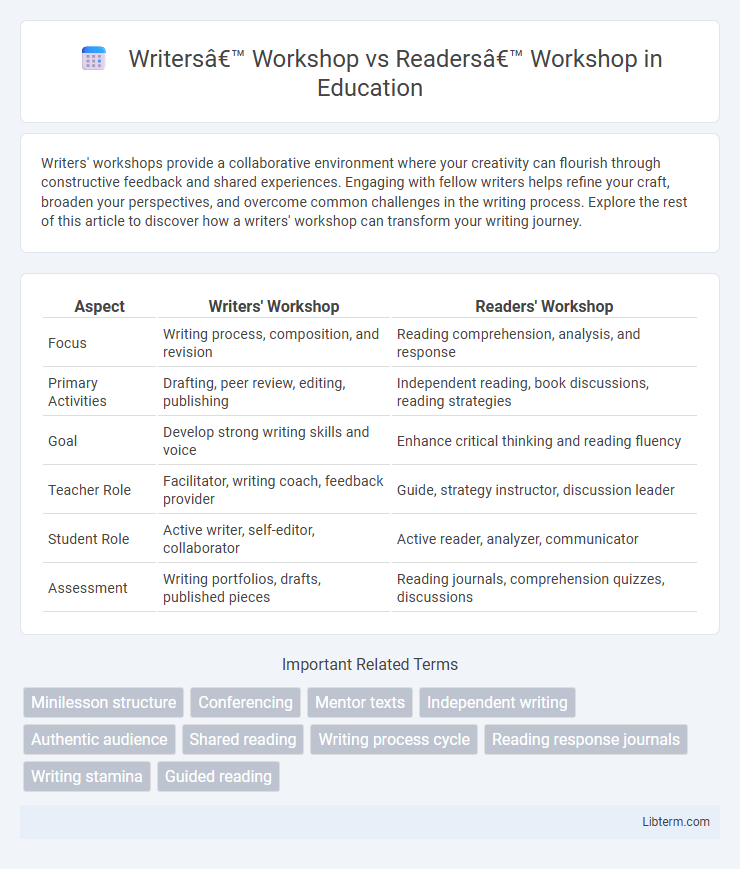Writers' workshops provide a collaborative environment where your creativity can flourish through constructive feedback and shared experiences. Engaging with fellow writers helps refine your craft, broaden your perspectives, and overcome common challenges in the writing process. Explore the rest of this article to discover how a writers' workshop can transform your writing journey.
Table of Comparison
| Aspect | Writers' Workshop | Readers' Workshop |
|---|---|---|
| Focus | Writing process, composition, and revision | Reading comprehension, analysis, and response |
| Primary Activities | Drafting, peer review, editing, publishing | Independent reading, book discussions, reading strategies |
| Goal | Develop strong writing skills and voice | Enhance critical thinking and reading fluency |
| Teacher Role | Facilitator, writing coach, feedback provider | Guide, strategy instructor, discussion leader |
| Student Role | Active writer, self-editor, collaborator | Active reader, analyzer, communicator |
| Assessment | Writing portfolios, drafts, published pieces | Reading journals, comprehension quizzes, discussions |
Introduction to Writers’ Workshop and Readers’ Workshop
Writers' Workshop introduces students to structured writing processes, emphasizing drafting, revising, and publishing to build essential literacy skills. Readers' Workshop focuses on cultivating strong reading habits by engaging students with diverse texts and teaching comprehension strategies. Both workshops prioritize student-centered learning but target different foundational skills in literacy development.
Core Principles of Writers’ Workshop
Writers' Workshop centers on student-centered writing development through consistent practice, explicit mini-lessons, and personalized feedback, emphasizing the writing process phases: brainstorming, drafting, revising, editing, and publishing. It prioritizes choice in topics to foster motivation and ownership, integrating peer collaboration and teacher conferencing to enhance skill-building. The core principles include iterative writing cycles, purposeful instruction targeting writing strategies, and creating a supportive community that encourages risk-taking and authentic expression.
Core Principles of Readers’ Workshop
Readers' Workshop centers on student choice, authentic reading experiences, and fostering a love for literature through individualized reading time and book selection. Core principles include mini-lessons focusing on comprehension strategies, guided reading groups tailored to students' reading levels, and opportunities for reflection and discussion to deepen understanding. This framework promotes independence and engagement, contrasting with the more instructive, skill-based focus typical of Writers' Workshop.
Key Differences Between Writers’ Workshop and Readers’ Workshop
Writers' Workshop emphasizes the process of writing, including drafting, revising, and publishing, while Readers' Workshop centers on reading comprehension, strategy instruction, and independent reading practice. Writers' Workshop fosters skills like brainstorming, organizing ideas, and editing, whereas Readers' Workshop develops vocabulary, fluency, and critical thinking through text analysis. The structure of Writers' Workshop often includes mini-lessons on writing techniques, peer conferencing, and sharing, contrasting with Readers' Workshop activities such as guided reading, book discussions, and personalized reading goals.
Similarities and Overlapping Strategies
Writers' Workshop and Readers' Workshop both emphasize student-centered learning through small group instruction and individualized feedback, fostering independent skill development in literacy. Both approaches integrate strategy minilessons targeting specific skills such as drafting, revising, comprehension, and critical thinking, promoting active engagement with texts. Shared strategies include conferencing, goal setting, and the use of mentor texts to model effective writing and analytical reading techniques.
Structure and Daily Routines in Writers’ Workshop
Writers' Workshop is structured around explicit mini-lessons, independent writing time, and individualized conferences that emphasize developing writing skills through practice and feedback. Daily routines consist of a predictable sequence including a brief teaching session, focused writing periods, and reflection or sharing to reinforce learning and build writing stamina. This consistent structure fosters student ownership over their writing process while promoting skill growth through iterative revisions.
Structure and Daily Routines in Readers’ Workshop
Readers' Workshop typically follows a structured daily routine that includes a mini-lesson, independent reading time, and a sharing session, enabling students to engage deeply with texts and develop comprehension skills. The structure emphasizes choice in reading materials, allowing learners to select books that match their interests and reading levels, promoting motivation and personalized learning. Regular conferencing between teacher and student during independent reading supports targeted instruction and progress monitoring, differentiating Readers' Workshop from the more writing-focused Writers' Workshop.
Benefits for Student Learning and Literacy Development
Writers' Workshop promotes student learning by fostering creativity, enhancing writing skills, and building confidence through personalized feedback and iterative drafting. Readers' Workshop supports literacy development by cultivating comprehension, critical thinking, and a lifelong love for reading through guided discussions and independent choice. Both workshops complement each other, creating a balanced literacy environment that improves overall academic achievement and effective communication.
Challenges and Best Practices in Implementation
Writers' Workshop often faces challenges such as scaffolding writing skills and providing timely, specific feedback, requiring educators to implement structured mini-lessons and peer review strategies for improvement. Readers' Workshop requires careful selection of leveled texts and fostering deep comprehension skills, best supported by guided reading groups and strategy instruction tailored to diverse learner needs. Successful implementation of both workshops hinges on creating a balanced, student-centered environment with flexible pacing and ongoing formative assessments to address individual progress.
Choosing the Right Workshop Model for Your Classroom
Choosing the right workshop model for your classroom depends on student goals and instructional focus, with Writers' Workshop emphasizing skill development in writing processes such as drafting, revising, and editing, while Readers' Workshop centers on building reading comprehension, fluency, and critical thinking through guided reading and discussion. Writers' Workshop benefits classrooms aiming to enhance students' ability to express ideas through various writing genres, while Readers' Workshop suits environments prioritizing literature analysis and independent reading habits. Considering factors like student age, curriculum standards, and time allocation will help educators select a workshop model that maximizes engagement and learning outcomes.
Writers’ Workshop Infographic

 libterm.com
libterm.com